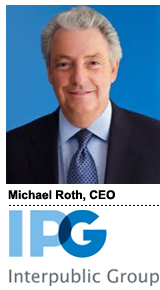
Times are changing at IPG.
The holding company used to tout its neutrality around data and technology, with CEO Michael Roth using the phrase, “Why buy it when you can rent it?”
But IPG’s $2.3 billion acquisition Monday of Acxiom Marketing Solutions changes all that.
“What’s interesting is the world has changed,” Roth said on a call with investors Tuesday. “Given the scale necessary to compete on a global basis, and the relationships between data and marketing services, we had to take a hard look at the question of renting versus owning.”
AMS, Acxiom’s legacy data management division, is the most significant acquisition IPG has made in years. With it, the holding company hopes to fuel its data platform, AMP, with Acxiom’s consumer data, which covers two-thirds of the world’s population.
AMS will allow IPG to power creative, PR, shopper, business transformation and experiential agencies while “adding steroids to our Cadreon business,” Roth said.
IPG also plans to leverage AMS’ 1,600 data scientists and 200 technology and product specialists to better address clients’ needs around data management, architecture and solutions – a service IPG couldn’t do effectively previously.
“Candidly, we were turning business away because we couldn’t provide the in-depth data opportunities that Acxiom brings … or the level of sophistication they were looking for,” Roth said.
According to Philippe Krakowsky, chief strategy and talent officer at IPG and chairman and CEO of IPG Mediabrands, AMS puts IPG three years ahead on its journey to data expertise.
“Data and analytics is where we’re seeing the most significant opportunity,” he said. “We’ve previously been comfortable renting data and building a product layer on top of it, but this strategy would no longer be efficient.”
While AMS won’t create any immediate cost synergies for IPG, it will offer opportunities to cross-sell clients on services like first-party data and CRM management and products around vertical-specific data.
“Even as marketing services or media partners, we’re seeing [clients] ask questions like, ‘Is my data architecture right?’” Krakowsky said. “We see opportunities to take core data management and consulting expertise and sell that to clients.”
AMS also gives IPG the opportunity to diversify its revenue with higher-margin offerings as clients cut back on traditional agency services.
“AMS is a very solid business on its own,” Roth said. “It has higher margins than our existing business and good growth.”
AMS has relationships with many of IPGs competitors, but Roth told shareholders conflicts of interest are more likely to exist on the LiveRamp side of the business, which IPG is not acquiring. IPG will continue to use LiveRamp’s onboarding services for clients.
IPG has had its eye on AMS for quite some time. Roth compared the purchase to Dentsu Aegis Network’s 2016 acquisition of Merkle.
“Given what’s happening in the marketplace with GDPR and issues being raised in the US on [data] security, this was a unique opportunity for us,” he said. “This is a big bet for IPG.”
Pivotal research analyst Brian Wieser agreed, calling the acquisition in a note to investors “arguably the most significant M&A activity within the agency space since Publicis bought Sapient in 2014.”
This post was syndicated from Ad Exchanger.


More Stories
The Oscars Are the Super Bowl For Brands Targeting Women
The Streamers to Watch at the Oscars: Netflix Leads, But Mubi Has Substance [Updated]
Ticker: ABC News to Offer Special Coverage of the Oscars